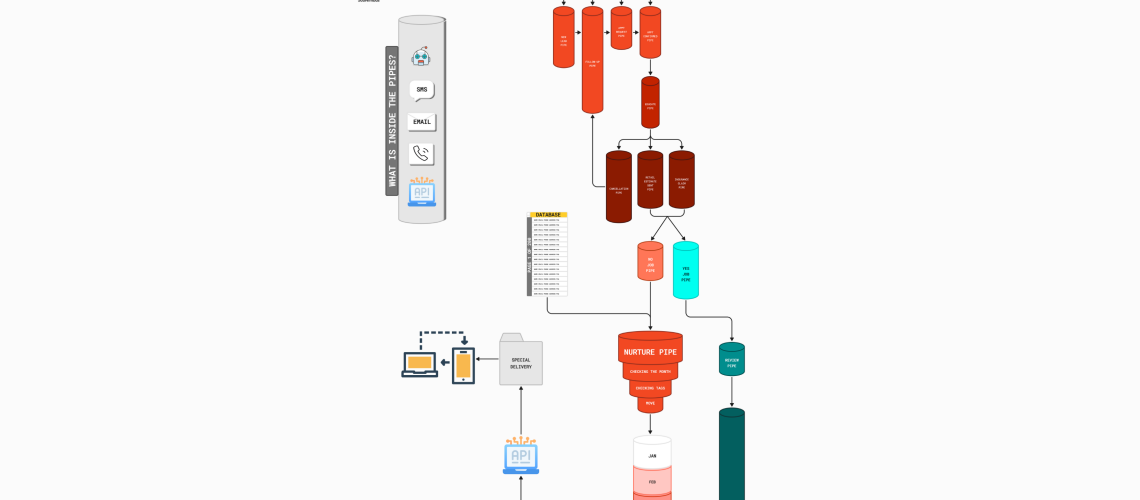In the HVAC industry, the ability to manage leads effectively can make or break a business. With the growing competition and increasing customer expectations, relying on manual lead management processes is no longer enough to stay ahead. HVAC companies need a system that ensures no lead slips through the cracks, while also maintaining a consistent follow-up strategy.
This is where lead management automation comes in—a powerful solution that removes human error, speeds up response times, and keeps your sales pipeline flowing seamlessly. By automating lead management, HVAC companies can boost their efficiency, prevent lost opportunities, and focus on what truly matters: growing their business.
Here are some of the direct benefits:
1. Organization and Efficiency
Automation helps HVAC companies stay organized by keeping leads in a centralized system where no potential client is overlooked. Automated lead management systems ensure that every lead is recorded, tracked, and followed up on, reducing the chance of losing potential business.
2. Removing Human Emotion from the Process
Humans are naturally emotional, and salespeople might not always follow up consistently due to discouragement, frustration, or bias. By automating lead follow-ups, HVAC companies can ensure that every lead is treated the same, regardless of the salesperson’s emotions or external factors. Automation adds a layer of objectivity to each interaction, keeping the process efficient and professional.
3. Consistent Lead Follow-Up
Studies show that salespeople often fail to follow up adequately on leads—whether due to time constraints, losing track of leads, or prioritizing “warmer” leads over others. Automated lead management systems can send timely follow-up emails, texts, or even schedule calls automatically, ensuring every lead gets the attention it deserves at the right moment.
4. Sales Leakage Prevention
One of the biggest issues HVAC companies face is sales leakage—the loss of potential revenue due to leads falling through the cracks. Automating lead management can help prevent this by ensuring no lead is forgotten or ignored. Automated reminders, follow-ups, and lead nurturing campaigns prevent leads from getting lost in the sales process, allowing HVAC companies to maximize their sales potential.
5. Speed to Lead
In the HVAC industry, leads often go to the first company to respond. Automation ensures immediate follow-up with potential clients through auto-responders, chatbots, or instant notifications to sales teams. By shortening the “speed to lead” response time, HVAC companies can get in front of prospects faster, increasing their chances of closing the deal.
6. Nurturing Cold or Long-Term Leads
Not all leads are ready to convert immediately, especially for high-ticket HVAC services. Automation allows HVAC companies to nurture cold leads over time through drip email campaigns or regular check-ins, keeping the company top of mind when the lead is ready to take action. This long-term nurturing increases the chance of converting leads who are in the research phase.
7. Improved Data Collection and Reporting
Automation provides HVAC companies with better insights into lead performance and customer behaviors. With an automated system, they can track which sources are bringing in the most leads, which follow-up strategies are most effective, and where potential sales drop off. This data enables better decision-making and allows companies to adjust their strategies to improve conversion rates.
8. Scalability
As HVAC companies grow, the manual management of leads becomes increasingly difficult and time-consuming. Automating lead management allows businesses to scale their operations without adding to the workload. An automated system can handle hundreds or thousands of leads simultaneously, ensuring no opportunities are missed, regardless of the business’s size.
9. Personalized Customer Experience
Automation doesn’t mean impersonal communication. With the right system in place, HVAC companies can personalize their automated messages by using customer data (like name, service request, or location). Personalization keeps interactions relevant and engaging, which is important for creating a connection with potential clients.
10. Time Savings for Sales Teams
By automating repetitive tasks such as follow-ups, appointment scheduling, and email responses, sales teams can focus on high-value activities like closing deals or building relationships with larger prospects. This saves time and increases overall efficiency.
11. Competitive Advantage
In a competitive market, HVAC companies that adopt automation can gain an edge over competitors who are still relying on manual processes. Automation allows for faster responses, more consistent follow-ups, and a better customer experience, all of which are crucial for winning and retaining customers.
HVAC companies that automate their lead management systems are more organized, efficient, and capable of preventing sales leakage. By removing human error and emotional biases from the process, HVAC businesses can ensure that every lead is nurtured and followed up on, improving conversions, customer experience, and overall revenue.
Check out this HVAC system we designed.




